How To Get On The Dark Web Safely On Iphone
The dark web is the most controversial and dangerous part of the internet — and it can only be accessed with certain browsers, such as Tor. It's generally portrayed as a bad place where criminals gather to communicate away from the law. Although that's partially true, there are also plenty of good reasons for you to access dark web websites.
A major benefit to using the dark web is anonymity. However, this only extends as far as the network — your ISP (for example) can see you're accessing it and could report it to the authorities, even if you're not doing anything illegal.
The only way to stay completely anonymous on the Tor network is to use a VPN. This encrypts your internet traffic and reroutes it through its private servers. This hides your personal data from prying eyes, hackers, trackers, and other cyber threats associated with accessing the dark web.
For the highest level of security, I recommend ExpressVPN. It enforces a strict no-logs policy and uses military-grade encryption to keep you anonymous. You can even try it risk-free because it's backed by a 30-day money-back guarantee — if you find it's not for you, you can easily claim a refund.
Try ExpressVPN Risk-Free Now
Quick Guide: How to Access the Dark Web Safely in 3 Easy Steps
- Get a VPN. I recommend ExpressVPN because it's highly secure, superfast, and offers a combination of privacy features to keep you anonymous on the dark web.
- Download Tor. Navigate to Tor's download page and choose your device. You will have the option to configure it, or you can connect right away.
- Browse the dark web! Connect your VPN before you open Tor to ensure the highest level of security while browsing.
Access The Dark Web Safely Today
What is the Dark Web?
The dark web is the 3rd layer of the internet, after the surface web and deep web. Here's a general explanation of what you can find on each layer:
The Surface Web
The surface web — or clean web — is the part of the internet you can access at any time using mainstream browsers (like Chrome, Firefox, Safari, etc.). Any indexed page you can access through a simple Google search is included. You can only see the information that the website's administrator wants you to and can't access the files in the backend, account pages, or archives.
As an example, you can browse products from online stores (like eBay) on the surface web. However, what you see and do on the site is limited until you log into an account — this is when you enter the deep web.
The Deep Web
The deep web is the private layer, and it's often password-protected. It's the biggest part of the web, taking up about 96% of the internet. Deep web pages can't be accessed through a simple search, as search engines do not index them — it's a layer of the internet only accessible to people with a specific link or login credentials.
This category includes cloud drives, account pages on different websites, medical records, credit card information, reports, etc. Most times, you need a specific URL and a password to access pages on the deep web. For example, your company database would be on the deep web.
The dark web and the deep web are not the same, although people often use these two terms interchangeably.
The Dark Web
The dark web is the third layer of the internet and the hardest to find. It consists of websites that can't be accessed using a regular browser. It also uses a different URL structure than sites on the surface and deep web. Websites on the dark web have a string of random letters and numbers that end with.onion instead of.com. While the surface and deep web can be accessed using a regular web browser, you need specialsoftware to access.onion sites. Tor is the most commonly used browser for the dark web; however, additional networks include Freenet, Riffle, and I2P. You can find both legal and illegal websites/activities on the dark web, as it isn't regulated in any way.
Tor and other dark web browsers offer limited protection — even your ISP can see when you access it. This is because they only work as gateways to the dark web, giving you access to a specific network. Your personal data may still be vulnerable to prying eyes, hackers, and cybercriminals — however, you can add an extra layer of protection when you browse the dark web while connected to a VPN.
Access The Dark Web Safely Today
Is the Dark Web Illegal?
The dark web is legal in most countries. As long as you don't engage in illegal activities, you shouldn't have any problems. However, in countries with high censorship (like China or the UAE), accessing the dark web is entirely illegal — I strongly advise that you abide by the law of your country to avoid facing legal consequences.
Even if the dark web is legal in your country, you may be put under surveillance for simply using a dark web browser, like Tor. Authorities use the dark web as a tool to catch criminals participating in illegal activities such as human trafficking, drug or weapon deals, and more. Here are some of the most infamous criminal cases involving the dark web:
- The Silk Road Case. This site was like the Amazon of the dark web. It started with a good cause in mind but ended up being a host for the sale of illegal goods — such as drugs, weapons, and forged paperwork. The person behind the website got caught because he promoted his website on the surface web using his real email address.
- AlphaBay Case. This website continued where the Silk Road stopped — it sold and traded drugs, weapons, and other illegal products. The owner ended up getting caught because he used weak passwords, his real email address, zero encryption, and more.
- The Ashley Madison Case. This one went viral. Ashley Madison was a website for extramarital affairs. Hackers released the information of people using this website, ruining a lot of lives. The hackers were never caught.
Although these types of stories leave a negative impression of the dark web, there is plenty of legal and positive activity that the dark web gives you access to. I recommend that you only visit trusted, reputable sites and protect yourself with additional security measures.
Access The Dark Web Safely Today
What Can I Do on the Dark Web?
There are many beneficial activities and resources available on the dark web, but it's important to keep your identity anonymous nonetheless. Using Tor without precautions can make you vulnerable to a number of cyber threats such as hackers, trackers, and malware. However, when you practice safety while visiting the dark web, you can enjoy the many positives it has to offer, such as:
- Free speech. The dark web gives people living in countries under heavy censorship a chance to communicate openly without risk of exposure.
- Exposing criminals or corrupt public figures. Journalists and whistleblowers turn to the dark web as a safe place to share/receive anonymous tips online or investigate controversial situations.
- Buying products cheaper. Some products can be found on the dark web for less money, such as electronics or security software — making purchases on the dark web is risky, so you should always use bitcoin and buy from credible sources.
- Research material. On the dark web, you can find free resources such as digital books and research papers.
- Communicating anonymously. There are online communities and support websites available on the dark web, where you can get tips and advice without revealing your identity.
- Get medical advice. If you're experiencing symptoms or have a health concern, there are doctors available on the dark web that can offer you their expertise. This is especially helpful for those who want to keep their health concerns personal, or simply don't have the funds to visit a clinic.
Before engaging in any dark web activities, I recommend researching sites ahead of time — use your regular browser to look online and see which sites are reputable. There's tons of information provided online by security experts, like ExpressVPN, recommending trustworthy.onion links.
Here are some safe and useful websites for the dark web:
- Daniel — a one-stop site that you can use to find other dark web pages by category or keyword and also check if they work.
- ProPublica — here you can find excellent pieces of investigative journalism.
- Hidden Answers — this is a dark web version of Quora where you can ask any question anonymously.
- Imperial Library — if you love reading, this dark website is great for you. You can find thousands of free books of any genre here.
- Hidden Wiki — this is another library of dark web links, but it's not as useful as Daniel since its links don't work sometimes.
- SecureDrop — if you have some information that you want to share with a journalist, this is the website to visit.
Access The Dark Web Safely Today
Dangers of the Dark Web You Should Know About
Due to the lack of oversight on the dark web, you are vulnerable to cyber threats any time you visit. These risks are easily avoidable when you are well-informed and know how to protect yourself against them.
Some of the most commonly seen dangers include:
Potential Malware
Browsing the dark web puts you at risk of cyberattacks such as DDoS attacks, botnets, and other malware or viruses. By simply entering the wrong URL or accidentally downloading a malicious file, you could install infectious viruses or malware. This can have a detrimental impact on your device, or even worse, expose your personal information.
To prevent these types of dangers, I recommend browsing the dark web with a direct goal in mind — research specific sites ahead of time and keep a list of links that you can trust.
Dangerous Activities
The dark web is the home of many criminal activities — from the use of stolen or fake documents to drug and weapon dealing. What's more, it's a network that includes assassins for hire, child pornography, and even live streams of murders. If you accidentally end up on one of those pages, you may face legal charges, should someone find out.
To avoid encountering disturbing or illegal situations, I advise against entering darknet sites before thoroughly researching them. I also recommend that you browse the dark web with complete anonymity by using a VPN — just to be safe.
Fraudulent Sites
Hackers on the dark web can easily access your personal data by using trojans, phishing, and other types of fraudulent websites or programs. Sometimes all it takes is a simple misclick before all of the information stored on your computer gets leaked. Even worse — cybercriminals have been known to activate computer cameras and microphones to get live streams from unsuspecting victims.
Most URLs on the dark web have unrecognizable names, so it's easy to fall for this trap — putting your private files, financial data, keystrokes, and other personal information at risk. My recommendation is to always use a VPN as you browse so that in any case, your real information isn't leaked.
Surveillance
In an attempt to stop the criminal organizations operating on the dark web, authorities are setting up fake websites to track possible criminal activity. By doing this, they get access to whoever is visiting the sites — and this includes you if you accidentally end up there. In some parts of the world, simply using a browser like Tor can get you flagged by these agencies, even if you don't partake in illegal activity.
Keep in mind that Tor is a product of the US government, so government surveillance is always a possibility. The best way to prevent your browsing activity from alerting authorities is to avoid sites with illegal activity altogether — another reason to only visit sites you've researched and trust.
Access The Dark Web Safely Today
Step-By-Step Guide: How to Access the Dark Web Safely
For safety purposes, I recommend that you only install Tor from its official website. I also strongly advise against changing the size of your window while you browse — it can lead to browser fingerprinting, which is a method used by hackers to collect specific data points about you.
How To Download Tor For Windows
- Get a VPN. My top recommendation is ExpressVPN. It offers military-grade encryption and an automatic kill switch that ensures your personal data is never exposed.
- Connect to any server. A local server will provide you with the fastest connection.
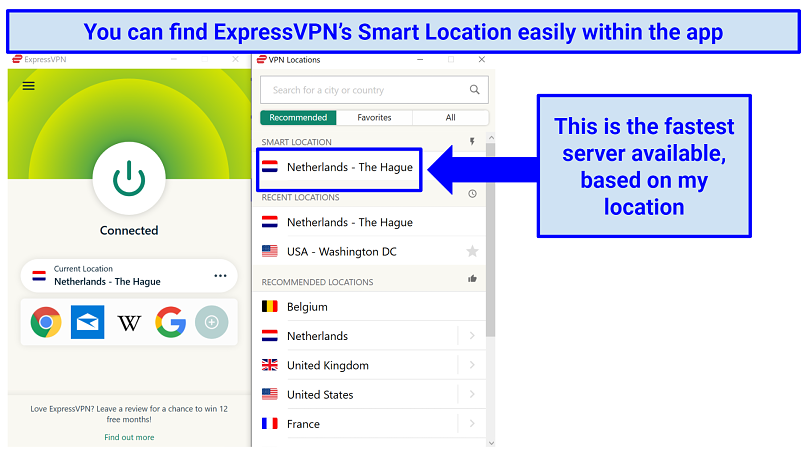
I usually use ExpressVPN's Smart Location to ensure I have the fastest connection while browsing
- Download Tor. Go to its download page and get the Windows installer.
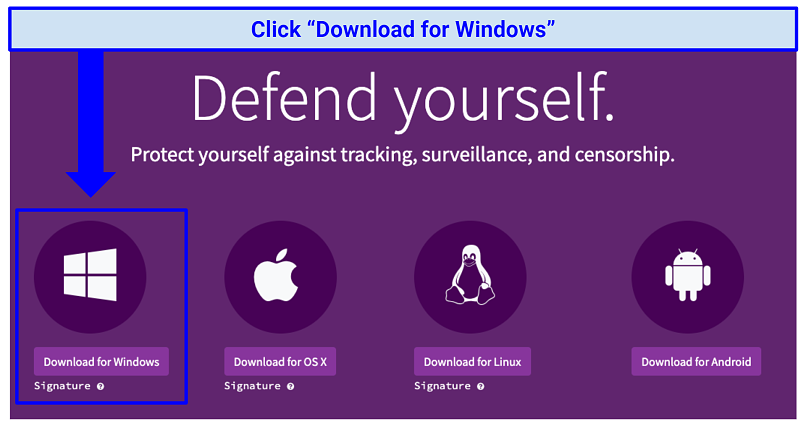
After clicking, it will begin downloading to your device immediately
- Open the installation file. Pick a language and go through the installation wizard.
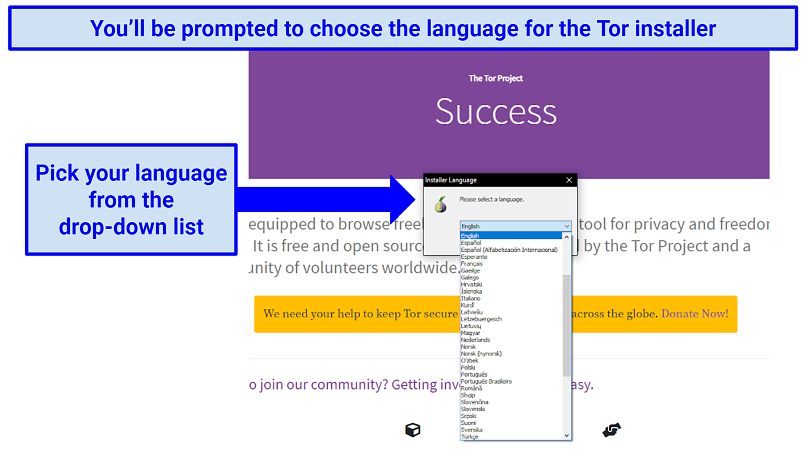
Languages are placed in alphabetical order
- Finish the installation. Once it's finished installing, you'll have a couple of options for how to proceed.
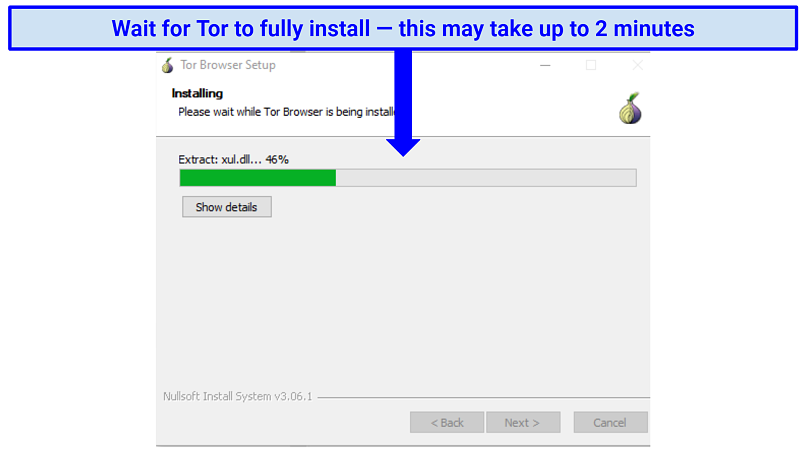
When it finishes installing, check the box that says "Run"
- Connect or configure Tor. Once Tor is installed, you have the option to "Connect" or "Configure". If you're browsing in a restrictive network or location, click "Configure". When you click "Configure", it will ask you if Tor is censored in your location, or if you're using a Proxy — then it will help you configure a pluggable transport. Otherwise, you can click "Connect" to begin browsing Tor immediately.
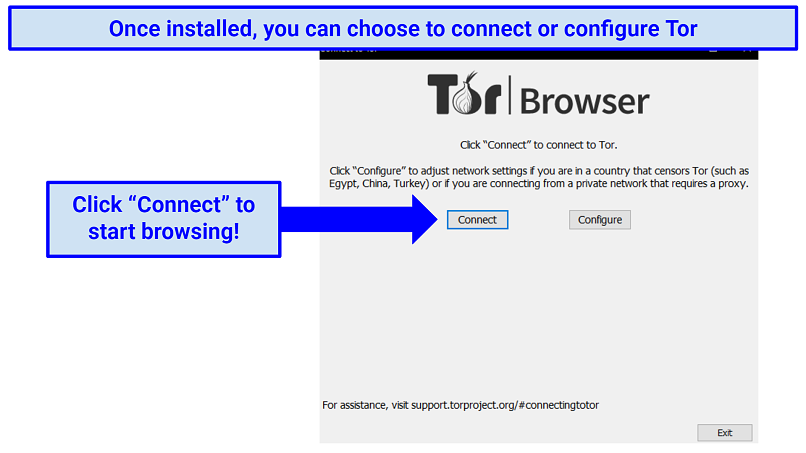
If you're using a proxy, you'll just need to enter in the proxy type, IP Address, and port
How To Download Tor For Mac
- Get a VPN. I recommend ExpressVPN for its military-grade encryption and leak protection that allows you to browse the dark web anonymously.
- Connect to any server. The local ones usually provide the best speeds, so choose the one closest to you. You can also select "Smart Location" and let the app find the fastest server automatically.
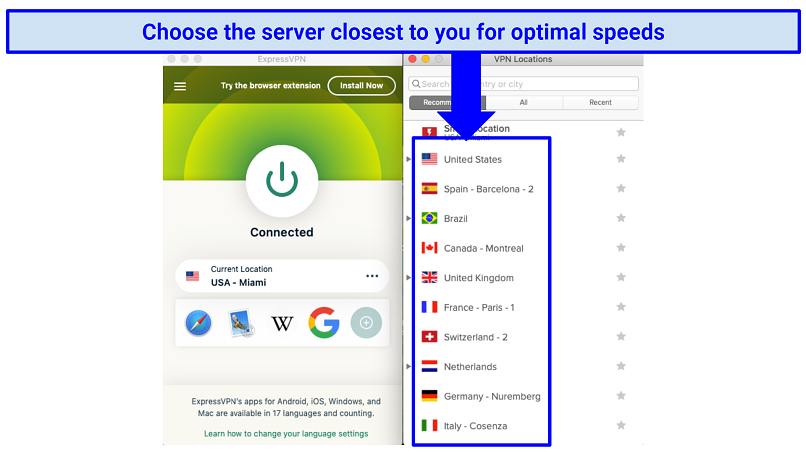
ExpressVPN has a huge server network, so the choice is up to you where you connect
- Download Tor. Access its download page and get the Mac file for your computer.
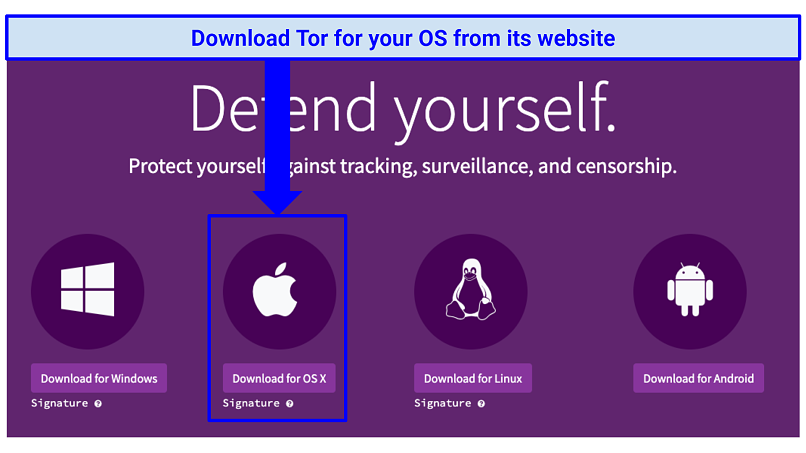
After clicking, your download will begin instantly
- Drag the file to the Applications window. This will start the installation process.
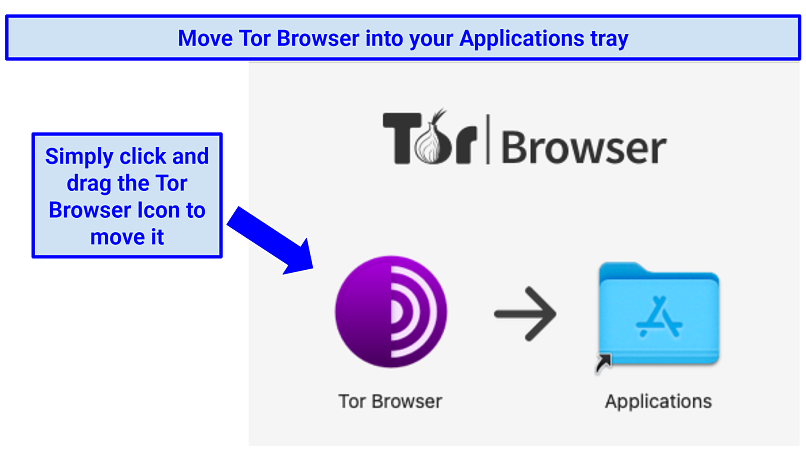
You'll be automatically prompted to take this step — Tor will now be filed with your other applications
- Connect or Configure Tor. If you're browsing in a restrictive network that blocks Tor, (such as a library or workplace), select "Configure". When you click "Configure", it will ask you if Tor is censored in your location, or if you're using a Proxy — then it will help you configure a pluggable transport. Otherwise, clicking "Connect" will allow you to browse immediately.
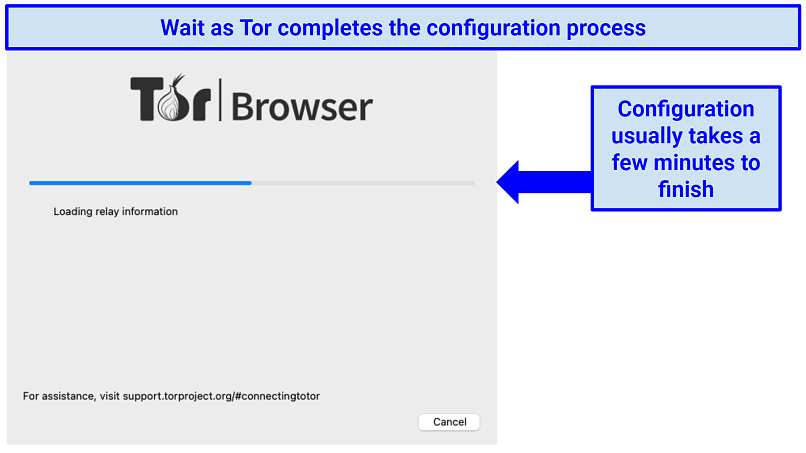
If you're using a proxy, you'll just need to enter in the proxy type, IP Address, and port
How To Download Tor For Linux
- Download a VPN. My top recommendation is ExpressVPN — its military-grade encryption and strict no-logs policy mean your online activity is always private.
- Connect the VPN. Open up a new terminal, then run this command: expressvpn connect. Or, to automatically connect to the "Smart Location", use the command expressvpn connect smart.
code. - Download Tor launcher. Navigate to the Tor download page on FlatHub — download the launcher for Linux.
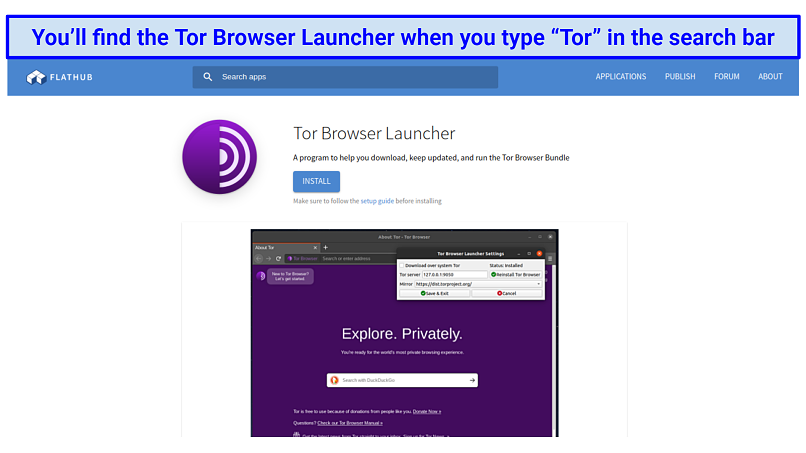
Click "Install" — this will download the file that will allow you to install Tor
- Install the file. Find the downloads folder (or whichever location you downloaded the Tor Launcher to) and open the file.
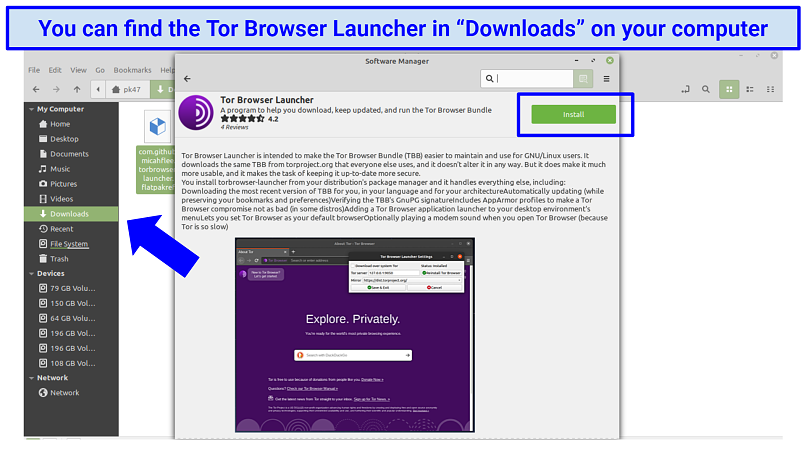
When you've pulled up the Tor Browser launcher, click "Install" — then wait a couple of minutes until it's finished
- Connect or configure Tor. Click "Launch" to start Tor. Then you have the option to "Connect" or "Configure". If you're browsing from a network that blocks Tor, choose "Configure". When you click "Configure", it will ask you if Tor is censored in your location, or if you're using a Proxy — then it will help you configure a pluggable transport. If not, you can select "Connect" to begin browsing the dark web immediately.
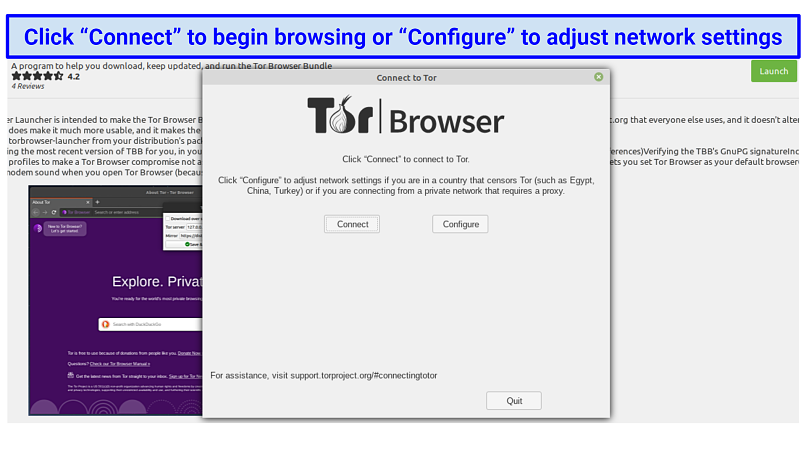
If you're using a proxy, you'll just need to enter in the proxy type, IP Address, and port
Access The Dark Web Safely Today
How to Set Up Tor
- Manage Tor's add-ons. I recommend enabling all of Tor's add-ons for added security. Click the hamburger icon, then Preferences > Extensions & Themes. Here, you'll find HTTPS Everywhere, which allows only HTTPS (safe) versions of sites. NoScript disables JavaScript on sites that aren't trusted. HTTPS Everywhere and NoScript are enabled by default, but you can manage them easily within Tor's settings if you want to.
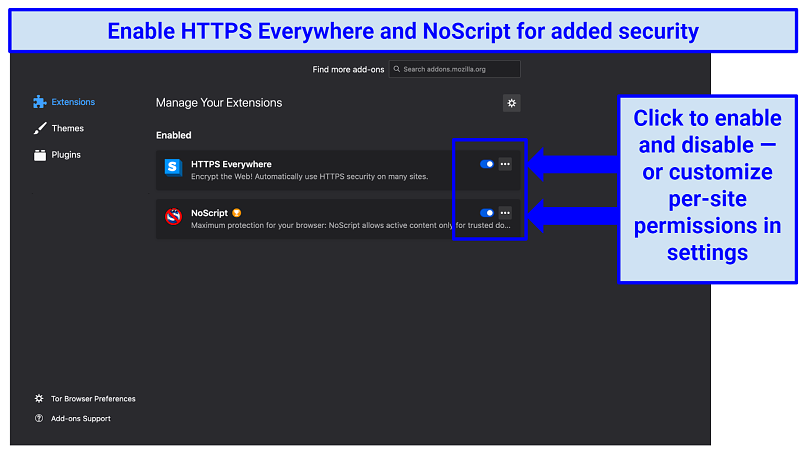
You can even specify for which sites you want to disable HTTPS Everywhere and NoScript
- Set the security level. For additional security, set Tor's security level to "Safest". To do this, simply click the shield button at the top right corner of the browser. Then click "Advanced Security Settings".
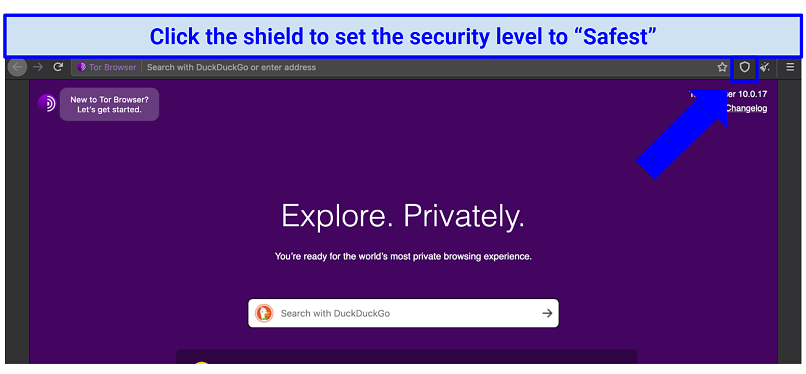
Your 3 security level options are Standard, Safer, and Safest — Safer and Safest disable scripts and other content which may have an affect on how the sites you visit function
- Enjoy accessing the dark web safely! Remember to connect your VPN before opening Tor for the highest level of security.
Access The Dark Web Safely Today
Best VPNs to Access the Dark Web Safely in 2021
1. ExpressVPN — Tons of Security Features For Safe Dark Web Browsing

- Military-grade encryption, a strict no-logs policy, and an automatic kill switch to keep your online activity hidden
- 3,000+ servers in 90 countries effectively mask your real location
- Superfast speeds keep the Tor Browser running smoothly
- Private DNS on every server for maximum privacy and security
- 30-day money-back guarantee
- Works With: Tor, Freenet, Invisible Internet Project (I2P), and more
- Compatible with: Windows, Mac, iOS, Android, Linux, routers, smart TVs, and more
Some of its additional security features include AES-256 bit encryption and DNS/IP leak protection. Leak protection is critical for keeping your personal information and location private, so that it doesn't end up in the hands of hackers or cybercriminals. I wanted to be sure you can rely on this, so I tested it with an independent tool — it didn't detect any leaks whatsoever. You'll have no problem accessing the dark web safely.
ExpressVPN uses Private DNS on all of its servers; instead of putting you at risk of DNS request exposure, it routes all of your dark web traffic safely through its own encrypted DNS servers. This ensures that no one can intercept or see your activity on the dark web. It also follows a strict no-logs policy, meaning it won't store any of your personal data. In addition, ExpressVPN is based outside of the 5/9/14 Eyes Alliances, so it's not required to share information with any agencies. You'll never be exposed to hackers, trackers, or prying eyes when you visit the dark web.
It comes with a network lock kill switch, so you're protected even if the server accidentally disconnects. In the unlikely event of a VPN failure, your internet connection will be shut down. I tested its effectiveness by activating the kill switch and changing the server. During the 15 seconds it took to update my location settings, my WiFi was disabled. You'll be completely anonymous even if the VPN fails.
Split tunneling lets you choose which apps to protect with the VPN. It takes just a couple of minutes to set it up. This gives you the ability to only route your Tor traffic through the VPN. Other apps, browsers, games, and P2P clients can still use your regular internet connection which optimizes speed and performance. This way, you can protect your dark web traffic without limiting your local network abilities.
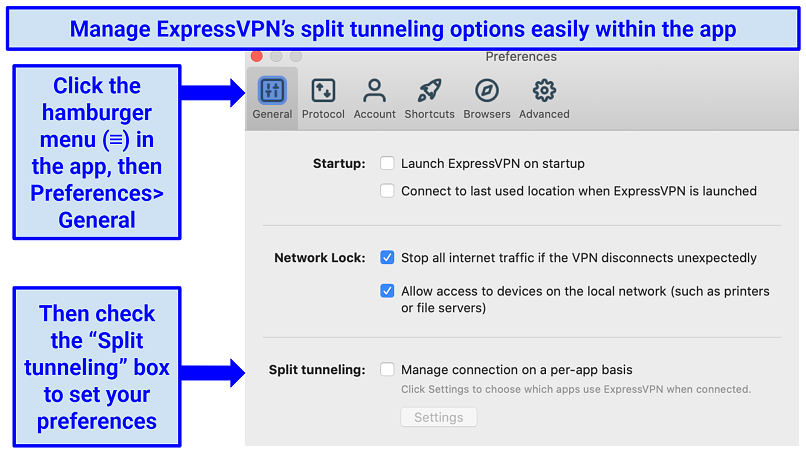
You can customize which websites are directed through your real IP address while allowing the rest to go through the VPN
The only issue I found with ExpressVPN is that it's a little pricey. However, with its latest discount, you can use its latest deal to get 49% off the initial price.
You can even try ExpressVPN risk-free before you make a long-term commitment. If you don't like it, you have 30 days to ask for a refund. I tested the refund process myself after using it for 26 days. All I had to do was contact an agent using its 24/7 live chat function. She asked me a couple of quick questions regarding my experience, and within 2 minutes issued my return. I received the money back within just 3 days.
Try ExpressVPN Now!
2. IPVanish — Private DNS Servers to Protect Your Dark Web Activity
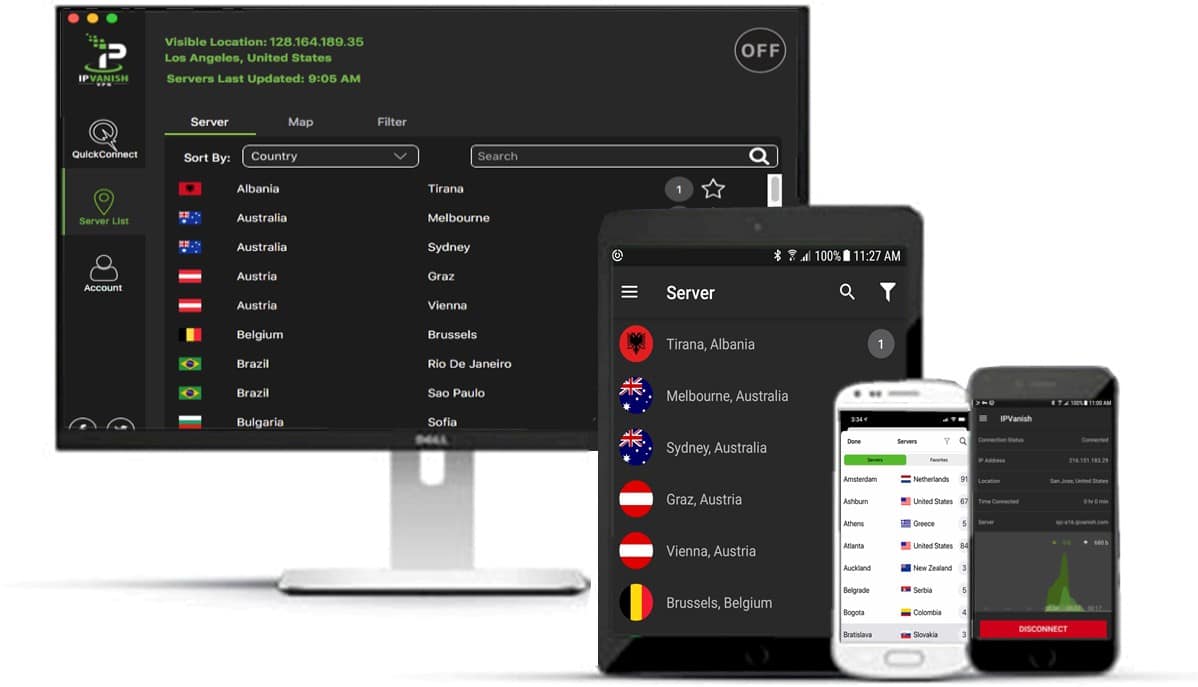
- Highest level of encryption, a strict no-logs policy, and a kill switch ensures complete privacy when you browse the dark web
- 1,900+ servers in 70 countries keeps your real location hidden
- Ultra-fast servers ensure no interruptions as you browse Tor
- Private DNS on every server for total anonymity and security
- 30-day money-back guarantee
- Works with: Tor, Freenet, Invisible Internet Project (I2P), and more
- Compatible with: Windows, Mac, iOS, Android, Linux, routers, smart TVs, and more
Since IPVanish uses Private DNS on every server, your personal information is always kept private. Private DNS routes your dark web activity through its own encrypted DNS servers instead of using third-party DNS addresses. To be sure, I ran tests on 4 locations: the US, UK, Germany, and France — I didn't find any leaks. No one will be able to hijack or block you while you browse the dark web.
To keep your browsing activity secure, it uses 256-bit encryption along with a kill switch. I tested this out by disconnecting my WiFi and attempting to load a webpage — it paused my request and sent an alert, telling me I was protected until I established a connection again. This way, not even a connection failure will leave you unprotected as you browse the dark web.
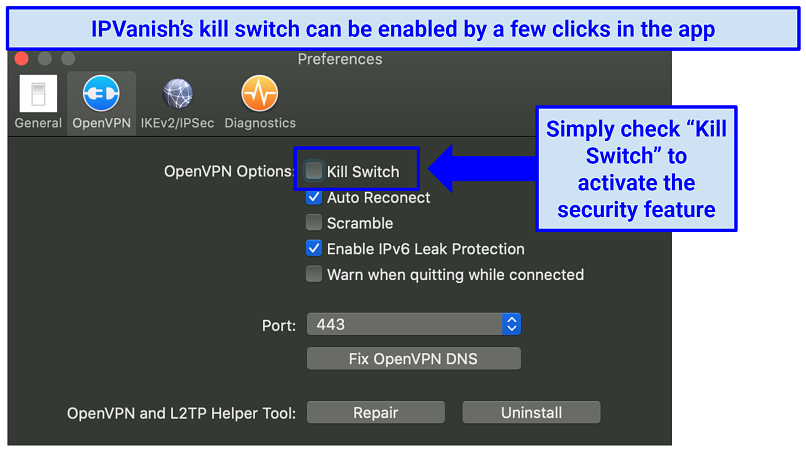
Find this feature under OpenVPN in the app's preferences
It also doesn't keep any activity logs, so there's no risk of your personal data being exposed. The moment you disconnect from its servers, your digital footprint is erased, leaving no proof that you ever connected to it. This makes it impossible for prying eyes to get ahold of any of your information, so you can access the dark web safely and privately.
The only downside to IPVanish is that it doesn't accept cryptocurrency payments, so you can't pay anonymously. However, it does take all the major credit cards and PayPal, so there are plenty of other options.
The best way to know if it's for you is to test it out with its 30-day money-back guarantee. When I tested this, all I had to do was log into my account on the website to request my refund. It took just a few minutes — there was no need to chat with an agent. My refund was accepted and returned to my account within 5 days.
Try IPVanish Now!
3. CyberGhost — No-Spy Servers to Keep Your Browsing Activity Hidden
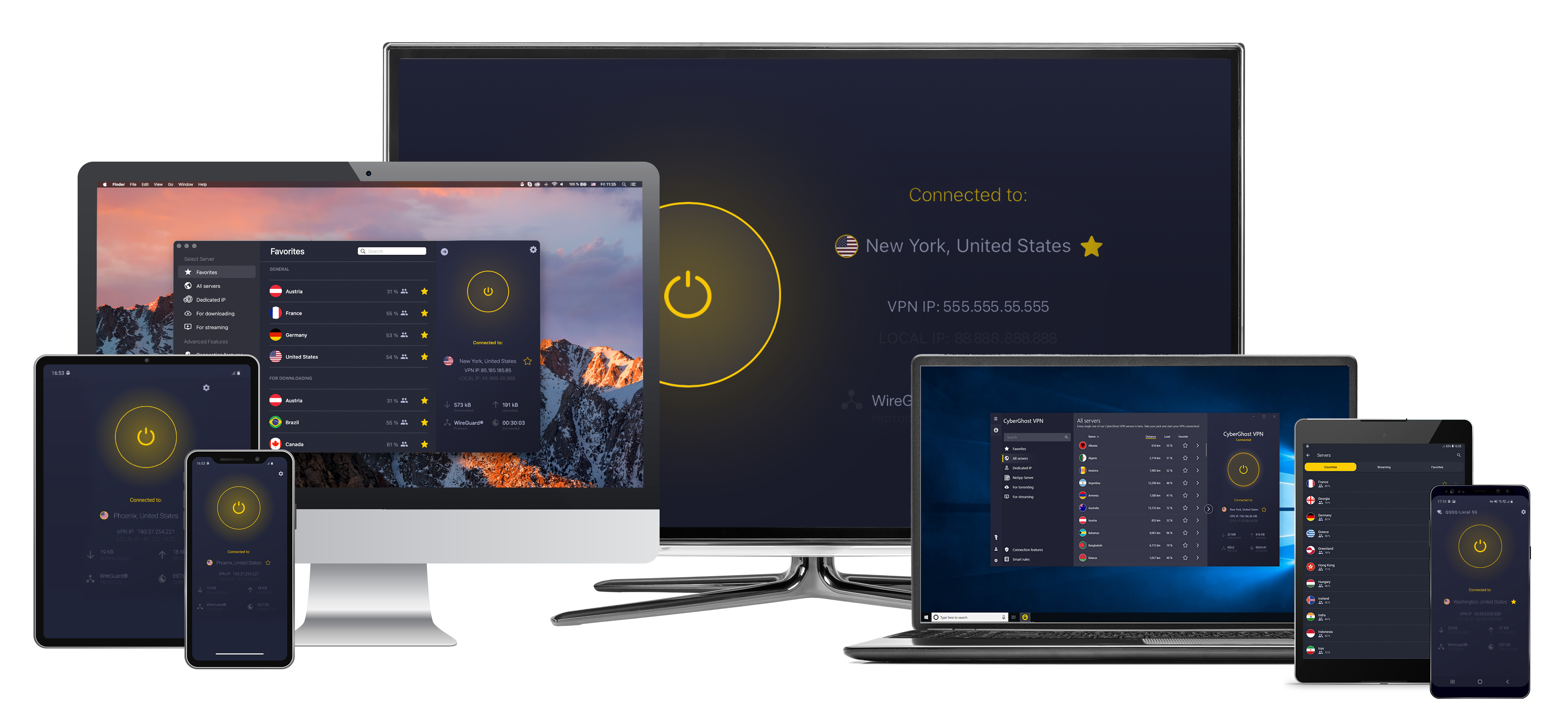
- Military-grade encryption, a strict no-logs policy, and a built-in kill switch for ultimate protection while you access the dark web
- 7,450+ servers in 90 countries to disguise your true location
- Lightning-fast speeds to keep loading times minimal when you browse with Tor
- No-Spy servers to ensure privacy and security when you visit the dark web
- 45-day money-back guarantee
- Works with: Tor, Freenet, Invisible Internet Project (I2P), and more
- Compatible with: Windows, Mac, iOS, Android, Linux, routers, smart TVs, and more
CyberGhost uses No-Spy servers for added assurance that no one can access your personal data. The encrypted servers are located inside CyberGhost headquarters in Romania and only certified staff members are allowed to access them. Romania is also outside of 5/9/14 Eyes jurisdiction, so you'll never have to worry about your information being exposed.
Even on all of Cyberghost's regular servers, it offers 256-bit encryption and DNS/IP leak protection. Plus, its no-logs policy means that none of your data is ever stored. During my tests, I used a leak detecting tool — it didn't find any. This means that any time you browse the dark web, you'll be completely anonymous.
It offers a kill switch that pauses your internet connection if the server cuts out. I tested this feature by connecting to a server in the US and then changing it to the UK. While my connection was established, Cyberghost notified me that my internet traffic was blocked until I was connected again. Even in case of a connection failure, your real IP and browsing data can't be exposed.
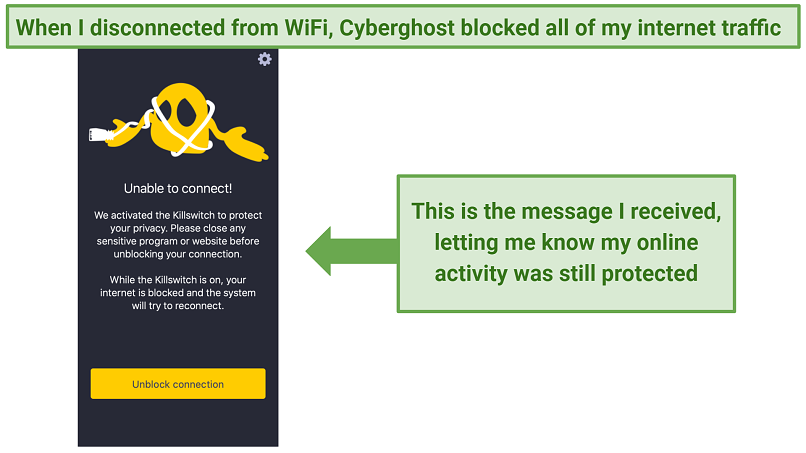
Cyberghost's kill switch is enabled by default — there's no manual configuration necessary
A small con is that CyberGhost's short-term plans are a little expensive. Fortunately, you can get a much better price with its 84% discount for new users.
If you're feeling unsure, it's easy to test it out using its generous 45-day money-back guarantee. After using it for 35 days, I reached out to customer support and asked for a refund. The agent only asked for the reason I wanted to cancel but approved my request shortly after. I had my money back within a week.
Try CyberGhost Now!
Additional Tips to Stay Safe on the Dark Web
While there are plenty of good reasons to access the dark web, it can also make you vulnerable to a variety of dangers. Using a trusted VPN like ExpressVPN will help protect you on the Dark Web. However, you should also practice common safety precautions to maximize your security when you browse. You should also take the following precautions:
- Use antivirus software. This will add a layer of protection to help keep you and your devices safe from cyberattacks. Keep up with the software updates — if a newer version comes out and you're still running an old version, it won't be equipped for blocking the latest cyberthreats.
- Use a different email. Instead of using your actual email address, sign up for a different one you can use solely for your dark web activity. You can even get an encrypted email address — for example, through ProtonMail.
- Keep your identity private. Don't use your real photo, phone number, or name.
- Use bitcoin. Instead of using your personal credit cards, use bitcoin — this offers an extra layer of anonymity when you make purchases on the dark web and protects you from having your financial information stolen.
- Only shop on trusted sites. Research the sites you plan to make purchases through ahead of time.
- Close all unnecessary apps and services on your device. For example — cloud services like OneDrive, banking, or streaming apps. This way, there's no chance of prying eyes getting ahold of your personal information through these sources.
- Turn off your location. If you have your GPS or location services enabled, turn it off. This will ensure that your true location isn't visible.
- Avoid add-ons. Tor automatically blocks some plug-ins (like Flash, RealPlayer, and Quicktime) — hackers have manipulated these to get users' real IP addresses in the past since they are out of Tor developers' control. Add-ons and browser extensions can also lead to tracking through browser fingerprinting.
- Disable JavaScript on your Tor browser. The reason being — in 2013, hackers found a way to track users by accessing their session details, which JavaScript provided.
- Don't change the size of your Tor window. This can lead to someone tracking you through browser fingerprinting.
- Cover your camera and your speaker. You can do this with a bit of opaque tape. This protects you from cybercriminals attempting to hijack your device for collecting unsolicited recordings of you.
- Research sites before visiting them. Only access links and websites you can trust.
- Be mindful of what you open. Don't click on pop-ups, ads, or any suspicious requests.
- Open your downloads offline. If you download a file from the dark web, disable the internet before opening it. Opening it while you're connected could potentially leak your real IP address.
- Use a security-focused OS. TAILS is one example — I also recommend that you run it from a removable drive. This way, hackers will have a hard time identifying your computer on the Tor network.
Access The Dark Web Safely Today
FAQs on Accessing the Dark Web Safely
Can I access websites on the dark web on my phone, iPad, or Chromebook?
You can access Tor on your phone or iPad (not advised) — but not on Chromebook. Tor offers apps for both Android and iOS. However, these devices do not keep your data secure. Should you decide to access the dark web from your mobile phone, I highly encourage you to protect yourself with a VPN. All of the VPNs in this list offer apps for iOS and Android, plus they use industry-leading security features to provide you with the highest level of privacy while you browse.
Android users will need to download Orbot and Orfox to access the dark web with their phone. Orbot will connect you to the Tor network, and Orfox is the actual browser that you will use. For iOS users, you'll need the Onion Browser app. Just remember to cover your camera and your speaker when you download these apps.
For Chromebook users — unfortunately, there isn't an official Tor app available for ChromeOS at this time.
Do I need a VPN to access the dark web?
Using a VPN on the dark web is a precaution I highly recommend. Tor provides you with anonymity inside the network, but your ISP can still see you're accessing it. Even if you're not doing anything illegal, Tor is often associated with criminal activities. This means that your ISP can either report you to the authorities or terminate your contract entirely.
Not only this, but any time you visit the dark web, you're vulnerable to a number of cyber threats — such as hackers trying to steal your data, malware, and viruses, etc. A VPN keeps you anonymous and protects your personal information so you can browse the dark web safely.
Can I access the dark web with a free VPN?
You can, but I strongly advise against it. To be sure your activity on the dark web is protected, I recommend only using a premium, reputable service.
Free VPNs don't offer the same security and reliability as premium ones. They have proven in the past to expose users' real IP addresses — this can lead to hackers and authorities intercepting your data. They also limit bandwidth and speeds, plus bombard you with annoying ads and popups. Using a free service is simply not worth the risk when you can get any of the VPNs in this list backed by a risk-free, money-back guarantee.
Are there Tor alternatives?
There are ways to access the dark web without Tor, but they offer different levels of accessibility and security. However, with any browser you use, there are risks involved in using the dark web so I advise that you browse with the added security of a VPN.
One separate network from Tor is I2P, which only lets you access its specific sites (called "eepsites" — you won't be able to use I2P to access as many sites as Tor. In addition, it's a bit more difficult to configure; after downloading and installing, you'll also have to manually configure it through the router, individual applications, and/or browser proxy settings.
On the other hand, I2P is faster and offers stronger peer-to-peer security than Tor, as it uses one-way tunnels to encrypt traffic — this means, only inbound or outbound traffic could be intercepted, not both. In addition, it uses a distributed network database which is harder to attack than Tor's fixed, trusted Directory servers.
Another alternative is Freenet; like I2P, it won't give you access to.onion links — only content that was uploaded to Freenet. It's more of an anonymous place for peer-to-peer content sharing. Users can form their own private groups for content sharing, called darknet mode. Or, they can use opennet mode to be randomly assigned to other peers on the network. Like I2P, it uses a distributed network database for added assurance against cyber attacks.
Configuring Freenet is simple — you just download and install. It runs automatically in your web browser when you open it, so I recommend using a different browser than you normally do to ensure privacy. You don't need a server to upload content to Freenet, and as long as your content is popular, it will remain.
Is there a dark web search engine?
Yes, there are a few — however, visiting sites you find through search engines can be dangerous; some sites are set up by hackers to collect your data while some contain malicious files that are harmful to your device. My advice is to research before entering sites you find through search engines and protect your personal information with a highly secure VPN.
Dark web search engines don't quite resemble the search engines you're used to seeing, like Google. Plus, they're not as efficient in helping you navigate to where you want to go. This is due to the ever-evolving nature of the dark web — search engines there simply can't keep up with the changes, often providing irrelevant or repetitive results.
However, there are a few reputable search engines that may provide you with a bit of assistance, such as:
- DuckDuckGo
- SearX
- Daniel
What's the difference between Tor over VPN and VPN over Tor?
The difference is the order in which your internet traffic travels. Tor over VPN directs your traffic through the VPN server before going through Tor's network — while VPN over Tor directs your traffic through Tor's browser first.
Both methods are better than the alternative of not using a VPN at all. In either case, I suggest that you use Tor with a VPN that doesn't keep logs — this way, prying eyes won't know that you're on Tor; they'll just know that you're using a VPN.
Keep in mind, using VPN over Tor is not advised — even by the Tor browser itself. In this case, your traffic goes through Tor's network first before going through a VPN. Your internet service provider still won't see your IP address, but they will know that you are using Tor.
Why isn't the dark web stopped or shut down?
The dark web hasn't been shut down since it's nearly impossible to do — plus, it helps authorities investigate crime and injustice around the globe. Since there are thousands of servers connecting the dark web worldwide, it won't help if one government shuts it down — it will continue to exist everywhere else.
The Tor network was developed by the US government to protect intelligence communication. It helps them identify criminals and communicate with activists from oppressed regions. There are even government-created sites that authorities use to catch criminals; to avoid legal trouble if you accidentally enter one of these sites, I advise that you access the dark web with adequate protection.
Access The Dark Web Safely Today
Stay Safe On The Dark Web!
The dark web is undoubtedly a dangerous place, but it can also create a lot of good for the world. It's useful for research, helping journalists shed light on injustice, communicating anonymously, and investigating criminal activity.
Despite its many benefits, it's important to protect yourself when you visit the dark web. You should always research sites before entering them to be sure they're not illegal or dangerous. In addition, using a VPN helps by keeping you anonymous and protecting your personal information.
For accessing the dark web safely, I recommend ExpressVPN — it's highly secure and keeps your browsing activity private. You can test it out risk-free, since it offers a money-back guarantee. If you decide that it's not for you, you're entitled to a full refund when you claim it within 30 days.
To summarize, the best VPNs for accessing the dark web safely are…
Privacy Alert!
Your data is exposed to the websites you visit!
The information above can be used to track you, target you for ads, and monitor what you do online.
VPNs can help you hide this information from websites so that you are protected at all times. We recommend ExpressVPN — the #1 VPN out of over 350 providers we've tested. It has military-grade encryption and privacy features that will ensure your digital security, plus — it's currently offering 49% off.
Visit ExpressVPN
How To Get On The Dark Web Safely On Iphone
Source: https://www.vpnmentor.com/blog/whats-the-dark-web-how-to-access-it-in-3-easy-steps/
Posted by: taylorwhovestaken.blogspot.com

0 Response to "How To Get On The Dark Web Safely On Iphone"
Post a Comment